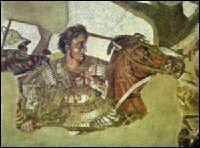
 |
 522-486
BC Darius the Great expands the Persian empire to include most
of Afghanistan.
522-486
BC Darius the Great expands the Persian empire to include most
of Afghanistan.
328 BC Alexander the Great invades present-day Afghanistan.
Invasions by the Scythians, White Huns and Turks follow.
642 AD Arabs invade and introduce Islam.
1219 Mongol invasion led by Genghis Khan, who destroys cities
and irrigation, permanently devastating agricultural areas.
1300 Tamerlane incorporates Afghanistan into Asian empire.
1747 Ahmad Shah Durrani, a Pashtun, founds what is known
today as Afghanistan.
1839-42 Britain, colonizer of neighboring India, starts the
first of two Anglo-Afghan wars, fearing Russian advances in Central
Asia seeking access to Arabian Sea. British army defeated.
1880-1901 Following Afghan victories in the second
Anglo-Afghan war (1878-80), British and Russians establish
boundaries of what would become modern Afghanistan.
1919 Third Anglo-Afghan war starts with Afghan attack on
India. War-weary British relinquish control by signing the Treaty of
Rawalpindi — celebrated on Aug. 19 as Independence Day.
1919-29 King Amanullah introduces reforms, such as the
abolition of traditional Muslim veil for women, alienating tribal
and religious leaders. He abdicates, and Prince Nadir Khan is
declared king.
1933 King Nadir is assassinated and succeeded by his
19-year-old son, Mohammed Zahir Shah.
1947 Britain withdraws from India. Pakistan is carved out of
Indian and Afghan lands.
1964 Constitution introduces a legislature. "Experiment
in democracy" produces few lasting reforms but spawns
unofficial extremist parties, including leftists tied to the Soviet
Union.
1953 Zahir's cousin, Sardar Mohammed Daoud, becomes prime
minister, exploits U.S. and Soviet rivalry to get military, economic
aid.
1973 Amid charges of corruption against royal family and poor
economy caused by drought, Daoud seizes power while the king
vacations abroad.
1978 Leftist coup leads to overthrow and death of Daoud and
most of his family. People's Democratic Party of Afghanistan imposes
a Marxist-style program running counter to deeply rooted Islamic
traditions and imprisons and murders thousands of members of the
traditional elite.
1979 Cabinet member Hafizullah Amin seizes power. U.S.
ambassador Adolph "Spike" Dubs is kidnapped and murdered.
Military assistance from Soviets to fight insurgency backfires when
Soviet troops invade, kill Amin, install puppet President Babrak
Karmal.
1985 Despite 120,000 Soviet troops, U.S.S.R. unable to
establish authority outside Kabul. Afghan freedom fighters (mujahedeen)
begin receiving weapons and training from the U.S.
1986 Rocket attacks on Kabul, assassinations of government
officials, low Soviet morale and popular displeasure lead to demise
of Karmal, replaced by Muhammad Najibullah, former chief of the
Afghan secret police.
1988 Geneva accords, which ensured Soviet withdrawal by Feb.
15, 1989, signed, after war claimed 14,500 Soviet and 1 million
Afghan lives.
1992 Soviet-supported Najibullah regime fights civil war with
mujahedeen, who had not participated nor signed the 1988 agreement.
Najibullah_s regime collapses, but with the demise of their common
Soviet enemy, rival mujahedeen groups clash. Burhanuddin Rabbani
seizes control after attempt to share power.
1994 The Taliban militia advance against the Rabbani
government.
1996-97 Rabbani and his chief military aide, Ahmad Shah
Massood, flee Kabul, captured by the Taliban.
Feb. 4, 1998 Earthquake in northeastern Afghanistan kills
more than 4,000 people.
Aug. 20, 1998 The U.S. fires cruise missiles on camps of
Osama bin Laden, a mujahedeen fighter among those earlier supported
by U.S., but who is now blamed for attacks on U.S. embassies in
Africa.
October 1998 U.N. adopts sanctions against the Taliban on
grounds of offering sanctuary to bin Ladin.
March 12, 2001 The Taliban regime demolished the two giant
statues of Buddha in Bamyan, despite international outrage.
July 2001 Taliban arrested 8 international workers indicted
for promoting Christianity in Afghanistan.
Sept. 9, 2001 Ahmad Shah Massood, leader of opposition
Northern Alliance, killed by suicide bombers posing as Arab
journalists.
Sept. 11, 2001 World Trade Center towers and Pentagon
attacked by hijackers. U.S. declares bin Laden the prime suspect.
Sources: State Department; The Washington Post; The Los
Angeles Times; Knight Ridder Newspapers; Gannett News Service;
Newhouse News Services; The Associated Press; Reuters; Times staff
research
|